Over 30 years of anarchist writing from Ireland listed under hundreds of topics
The Left
On visiting the Zapatista community of Oventic
Last November, I took part in a week-long language school at Oventic, Chiapas.[1] I spent the week living and learning with two US-based comrades – Laila, a tattoo artist and socialist/feminist from Memphis, and Michael, a housing rights activist from Baltimore – alongside the wider Zapatista community of Oventic. Our ‘guides’ for the week were our neighbours – Natalio and Paloma as well as Stephanie (who was learning to be a teacher) and Efrain (a linguist, philosopher and educator all rolled in to one). These were the people we met and spoke with every day. What follows are some reflections recorded along the way.
After the election of Syriza - Power is not in Parliament
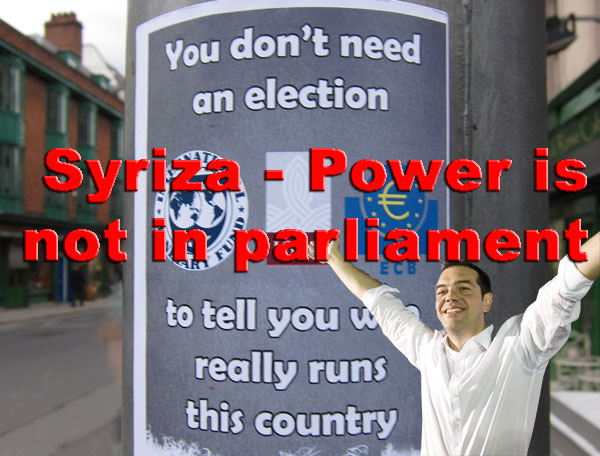 Today, across Europe, the left is excited by Syriza topping the polls in the Greek election. Some on the left have gone so far as to suggest the election itself will mark the end of austerity policies, in the terminology of the Anglo left, an end to the idea that There Is No Alternative (TINA). Another indication that something of significance is happening is that ahead of the election a new wave of capital flight has started from Greece with an estimated 8 billion transferred out of the country over the last few weeks.
Today, across Europe, the left is excited by Syriza topping the polls in the Greek election. Some on the left have gone so far as to suggest the election itself will mark the end of austerity policies, in the terminology of the Anglo left, an end to the idea that There Is No Alternative (TINA). Another indication that something of significance is happening is that ahead of the election a new wave of capital flight has started from Greece with an estimated 8 billion transferred out of the country over the last few weeks.
Turnips, hammers & the square - why workplace occupations have faded.
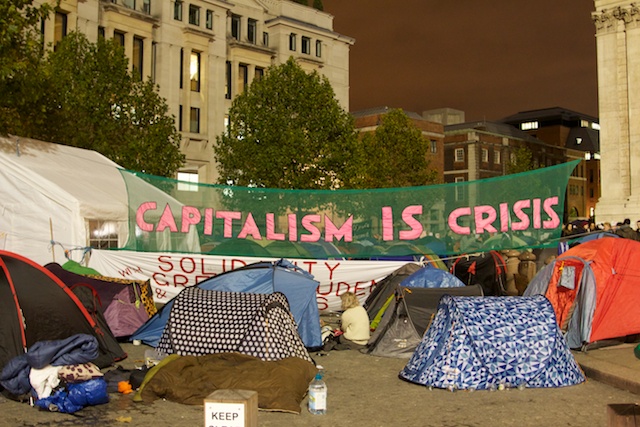 What if we build it and they don’t come? That was the experience of the left during the crisis - decades had been spent building organisations and a model of how crisis would create revolution, but when the crisis arrived the left discovered that the masses weren’t convinced. The expected pattern of crisis leading to small strikes and protests, then to mass strikes and riots and then perhaps to general strike and revolution didn’t flow as expected. Under that theory the radical left would at first be marginal but then as conditions drove class militancy to new heights, the workers disappointed by reformist politicians and union leaders, would move quickly to swell its ranks.
What if we build it and they don’t come? That was the experience of the left during the crisis - decades had been spent building organisations and a model of how crisis would create revolution, but when the crisis arrived the left discovered that the masses weren’t convinced. The expected pattern of crisis leading to small strikes and protests, then to mass strikes and riots and then perhaps to general strike and revolution didn’t flow as expected. Under that theory the radical left would at first be marginal but then as conditions drove class militancy to new heights, the workers disappointed by reformist politicians and union leaders, would move quickly to swell its ranks.My Life in Activism : Women speak at 2014 Dublin Anarchist Bookfair - Audio
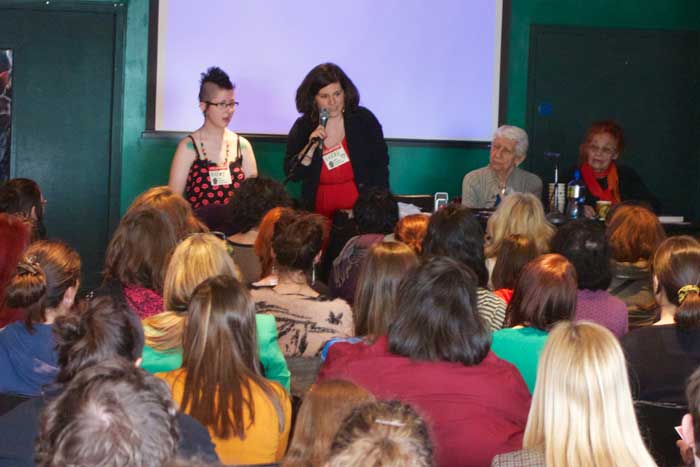
The 2014 Dublin anarchist bookfair hosted a panel of women activists who informed us about how they became involved in the movement, what drew them into this life of campaigning for social justice, rights and attempting to change the world in which we live. They inform us of how they remain motivated, inspired and sustained in active political life.
My Life in Activism : Women speak at 2014 Dublin Anarchist Bookfair - Audio by Workers Solidarity on Mixcloud
Solidarity, Engagement & the Revolutionary Organisation
Over the last couple of years the WSM has been going through a process of re-examining the way we relate to people interested in what we have to say. Alongside this we have recently begun to try and get a better understanding of what it is we do. Both these processes have some major implications in reaching an understanding of what the usefulness of a revolutionary organisation is in the modern era of broad and loose social networks.

Tear Gas & Twitter in Taksim - an anarchist eyewitness analysis from Gezi Park, Istanbul
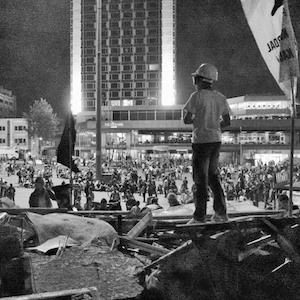 Tear gas is a very good place to start trying to understand what is happening in Turkey. The main purpose of tear gas is to terrorise and thus break up large crowds of people. In Istanbul over the last weeks huge quantities have been used over and over to prevent large anti-government demonstrations developing. This wasn't about 'riot control' - generally there was no riot to control. In this piece I'm going to put the Gezi park revolt in the context of the cycle of struggles that began in 2010 and of the specific economic, politcal and historical situation of the Turkish republic to try and draw out the lessons for all of us fighting global capitalism.
Tear gas is a very good place to start trying to understand what is happening in Turkey. The main purpose of tear gas is to terrorise and thus break up large crowds of people. In Istanbul over the last weeks huge quantities have been used over and over to prevent large anti-government demonstrations developing. This wasn't about 'riot control' - generally there was no riot to control. In this piece I'm going to put the Gezi park revolt in the context of the cycle of struggles that began in 2010 and of the specific economic, politcal and historical situation of the Turkish republic to try and draw out the lessons for all of us fighting global capitalism.
Elections: Quicksand for Socialist Ideas
 We don't live in a socialist world. In fact never before has capitalism exercised such total hegemony. Despite huge disaffection with austerity and global capitalism, for billions of people the world over, an alternative is impossible to imagine. One of the key tasks of the left then, is not just to oppose attacks on the living conditions of working class people, but to provide an alternative vision of a society where we do not exist to serve the economy, but rather the economy exists to serve us, a society where the slogan "from each according to their ability, to each according to their needs" becomes a reality.
We don't live in a socialist world. In fact never before has capitalism exercised such total hegemony. Despite huge disaffection with austerity and global capitalism, for billions of people the world over, an alternative is impossible to imagine. One of the key tasks of the left then, is not just to oppose attacks on the living conditions of working class people, but to provide an alternative vision of a society where we do not exist to serve the economy, but rather the economy exists to serve us, a society where the slogan "from each according to their ability, to each according to their needs" becomes a reality.
Failing to unveil Capitalism at Occupy - Paulo Freire’s Theoretical Framework
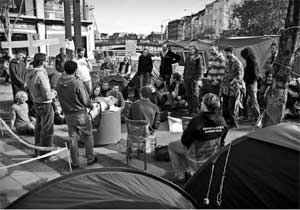 The Occupy movement may have come into our lives just over a year ago with a bang but it went out months later with a whimper. Cathal uses the benefit of hindsight to look at the phenomenon as it manifested itself on these shores and what anarchists could have done to make it work better. The difficulties as Cathal argues did not lie in making arguments for democracy has been the case in so many other campaigns but in that the occupiers “didn’t see this conception extending to the realm of economic production” and in developing the 99%/1% analysis into a deeper class analysis. Recognising problems with current modes of consciousness raising, he utilises Paulo Freire’s pedagogical framework in an attempt to subject “our own political strategies, methodologies and theories to critical scrutiny”.
The Occupy movement may have come into our lives just over a year ago with a bang but it went out months later with a whimper. Cathal uses the benefit of hindsight to look at the phenomenon as it manifested itself on these shores and what anarchists could have done to make it work better. The difficulties as Cathal argues did not lie in making arguments for democracy has been the case in so many other campaigns but in that the occupiers “didn’t see this conception extending to the realm of economic production” and in developing the 99%/1% analysis into a deeper class analysis. Recognising problems with current modes of consciousness raising, he utilises Paulo Freire’s pedagogical framework in an attempt to subject “our own political strategies, methodologies and theories to critical scrutiny”.
The experience of the Social Solidarity Network
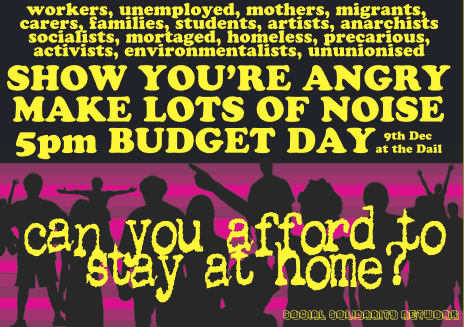 The Social Solidarity Network came into existence in the Autumn of 2009 in Dublin as an initiative of the Workers Solidarity Movement. It faded out of existence a few short months later and never amounted to all that much in the interim beyond a couple of meetings, a leaflet distribution at a mass ICTU march and a badly organised and executed protest at the Dail on budget day. Nevertheless there are some useful lessons (mostly of the ‘how not to do it variety’) to be taken from its short existence.
The Social Solidarity Network came into existence in the Autumn of 2009 in Dublin as an initiative of the Workers Solidarity Movement. It faded out of existence a few short months later and never amounted to all that much in the interim beyond a couple of meetings, a leaflet distribution at a mass ICTU march and a badly organised and executed protest at the Dail on budget day. Nevertheless there are some useful lessons (mostly of the ‘how not to do it variety’) to be taken from its short existence.
Revolutionary Organization in the age of Networked Individualism
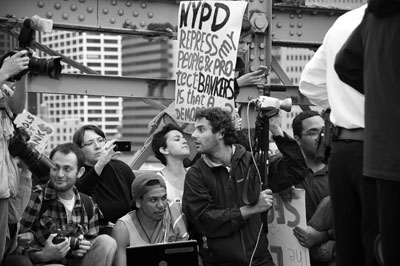 The revolutions and revolts that swept the world in 2011 took almost everyone by surprise. One of the first strong attempts to explain why they happened is Paul Mason’s ‘Why It’s Kicking Off Everywhere.’ He argues that “the materialist explanation for 2011...is as much about individuals versus hierarchies as it is about rich against poor.” By far the most provocative element of his book is the idea that communications technology, in particular the internet, is transforming the way people behave and that a significant contribution to the revolts of 2011 lie in these changes. If he’s right it had profound consequences for the form and structure of revolutionary organisations including anarchist ones.
The revolutions and revolts that swept the world in 2011 took almost everyone by surprise. One of the first strong attempts to explain why they happened is Paul Mason’s ‘Why It’s Kicking Off Everywhere.’ He argues that “the materialist explanation for 2011...is as much about individuals versus hierarchies as it is about rich against poor.” By far the most provocative element of his book is the idea that communications technology, in particular the internet, is transforming the way people behave and that a significant contribution to the revolts of 2011 lie in these changes. If he’s right it had profound consequences for the form and structure of revolutionary organisations including anarchist ones.
This article also availale on audio & video, see end.

